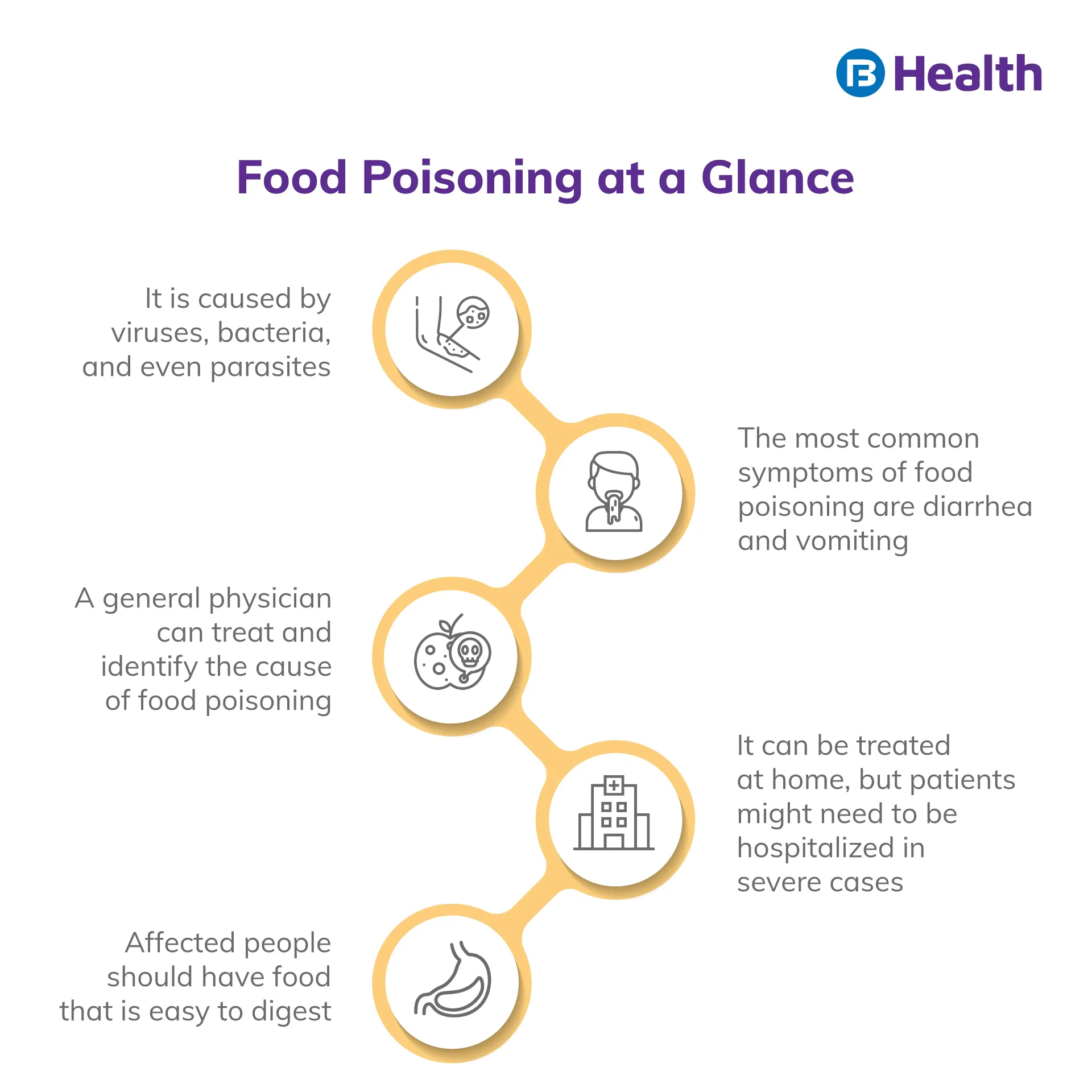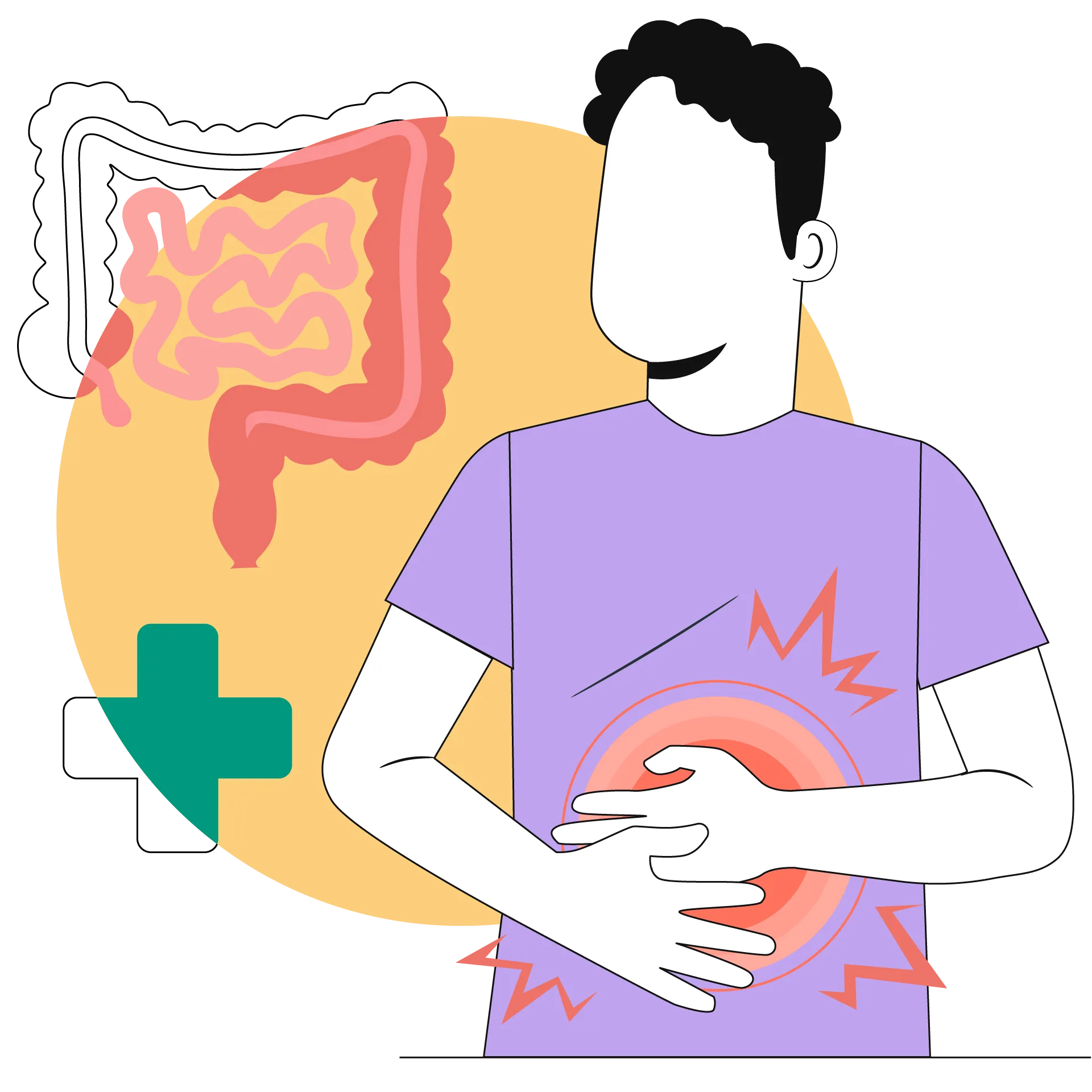General Physician | 7 min read
Food Poisoning: Symptoms, Types, Treatment, Diagnosis
Medically reviewed by
Table of Content
Synopsis
Food poisoning is a disease brought on by consuming foods contaminated with dangerous microorganisms. Food poisoning can occasionally occur when people don't wash their hands before handling it.
Key Takeaways
- Consuming contaminated food results in a condition known as food poisoning
- Salmonella or Escherichia coli (E. coli) bacteria or viruses, such as norovirus, typically cause food poisoning
- Food poisoning is more likely to affect kids, pregnant women, the elderly, and people with chronic illnesses
What is Food Poisoning?
Generally, eating contaminated food causes Food poisoning. However, infectious organisms, such as viruses, bacteria, parasites, or toxins, are the most prevalent reasons for food poisoning. In other words, we can say that if a person does not follow healthy food habits, then it can lead to food poisoning.Food can get contaminated by infectious organisms or toxins at any production or processing stage. The inappropriate handling or preparation of food can also lead to contamination at home. Food poisoning is usually minor and goes away on its own. However, some patients might require hospitalisation.
Types of Food Poisoning
Although there are at least 250 types of food poisoning, e.coli is the most common.
The following are a few types of food poisoning:1. E. Coli
- The scientific term for E. coli is Escherichia coli. It is a bacterium that resides in animals' digestive tracts
- The majority of E. coli strains are not harmful. E. coli O157:H7, on the other hand, is the most common cause of food poisoning
- In extreme situations, E. coli can cause severe diarrhea, stomach pains, and Haemolytic Uremic Syndrome (HUS). HUS might result in renal failure, stroke, or coma
- Although most healthy individuals recover quickly from E. coli infection, it can be fatal for kids and the elderly
2. Salmonella
- Salmonella is another bacterium found in the digestive tracts of both animals and humans
- Salmonella affects fruits and plants when animal feces pollute the irrigation water supply
- Humans may catch salmonella through their dogs
- Salmonella food poisoning symptoms often appear 12 to 72 hours after exposure.
- Infections of greater severity can also result in arterial infections, endocarditis, and arthritis
- The majority of people recover from salmonella without needing medical treatment. Antibiotics and intravenous fluids may be required for those with other health issues, kids, and the elderly

3. Listeria
- The bacteria Listeria monocytogenes is generally found in contaminated soil and water. It has the potential to infect raw meats, fruits, and vegetables
- Cooked or frozen meals can nevertheless support the bacteria's survival
- According to the CDC, listeria affects about 1,600 individuals yearly and kills over 200. Listeria infections can be dangerous or deadly in young children and the elderly. Expectant moms may experience miscarriages or stillbirths
- Adults in good health may only have short-term symptoms such as fever, headache, stiffness, nausea, and diarrhea
Food Poisoning Symptoms
The symptoms of food poisoning may vary based on the germ you ingested. The following are the most common signs of food poisoning:- Stomach Ache
- Cramps in the stomach
- Nausea
- Vomiting
- Diarrhea
- Fever
- Appetite loss
- Weakness
- Headache
Vomiting occurs early in the sickness, whereas diarrhea usually lasts a few days but might last longer depending on the organism producing the symptoms.
Food poisoning sickness can last anywhere from a couple of hours to many days. If you experience food poisoning symptoms, drink plenty of fluids to avoid dehydration (not having enough water in your body).
Additional read: Yoga for digestionSymptoms of fatal food poisoning include:
- Diarrhea for more than three days and a temperature of more than 38.9°C (102°F)
- Extreme dehydration includes trouble speaking or seeing, dry mouth, little to no pee, difficulty keeping fluids down, and bloody urine.
Get a doctor's consultation immediately if you see any of these symptoms.
Causes of Food Poisoning
Any stage of food production, including planting, harvesting, processing, storing, transporting, and preparation, is susceptible to food contamination. Cross-contamination, or the spread of hazardous organisms from one surface to another, is frequently to blame. This is especially problematic for fresh, ready-to-eat items like salads or fruit. Because these foods are uncooked, hazardous organisms don't die before consumption, resulting in food poisoning.Food Poisoning is caused by the following contaminants shown in the following table.
| Contaminant | Duration of Symptoms | Means of Transmission and food affected |
| Campylobacter | 2 to 5 days | Contamination happens during processing when animal faeces come into touch with meat surfaces. Unpasteurised milk and polluted water are two more possibilities. |
| Shigella | 1 or 2 days | (Raw, ready-to-eat fruits and seafood). An infected food handler can transmit the virus. |
| Staphylococcus aureus | 1 day | Hand contact, coughing, and sneezing can all spread the virus. (Cream sauces and cream-filled pastries, as well as meats and prepared salads) |

Food Poisoning Treatments
Food poisoning Treatment focuses on alleviating symptoms and minimising consequences, particularly dehydration. Food poisoning is treatable at home. The following are some natural cures.
1. Stay Hydrated
- Staying hydrated is essential. Electrolyte-rich beverages will be great in such conditions. Also, coconut water and fruit juice can help replenish carbs and alleviate weariness
- Avoid caffeine, which might irritate the digestive system. Decaffeinated teas containing calming herbs like peppermint, chamomile, and dandelion may help to soothe an upset stomach
2. Use over-the-counter (OTC) medicine
- OTC drugs such as Pepto-Bismol and loperamide (Imodium) can help control diarrhea and nausea
- However, you should see a doctor before these treatments since the body utilises vomiting and diarrhea to eliminate the poison. Furthermore, using these drugs may conceal the severity of your sickness and convince you to delay getting help from a general physician
3. Use prescribed Medicines
- Although many food poisoning cases resolve on their own, depending on the organism responsible for their sickness, some patients may benefit from prescribed medicines
- People who are elderly, immunocompromised, or pregnant may benefit from prescription medicines. Antibiotic medication during pregnancy aids in the prevention of infection transmission to the unborn child
4. Additional treatment options
- When individuals transfer staph germs from their hands to meals, they get infected. Bacteria may impact many different sections of your body. In this case, they require a staph infection treatment
- Also, take proper rest and give some relaxation to your body
What to Eat and Drink When You Have Food Poisoning?
Avoid solid foods until your diarrhea and vomiting tendencies are gone. Then, go back to your usual diet and consume easy-to-digest foods, such as:
- Saltine crackers
- Toast
- Gelatin
- Bananas
- Rice
- Oatmeal
- Potatoes
- Boiled veggies
- Chicken broth soda without caffeine, such as ginger ale or root beer diluted fruit liquids
- Sports drinks
What to Stay Away From
Even if you feel better, try to avoid hard-to-digest meals to keep your stomach from becoming more upset. Avoid the foods mentioned below:
- Dairy products, particularly milk and cheese
- Foods high in fat
- Foods that are fried
- Strongly seasoned meals
- Spicy meals with a high sugar content
Also, stay away from:
- Caffeine Products
- Alcohol Consumption
- Nicotine Products
How Food Poisoning is Diagnosed?
Based on your symptoms, a doctor may be able to determine the sort of food poisoning you have.
In extreme situations, blood tests, stool testing, and tests on the food you eat may be performed to discover what caused the food poisoning. A doctor may also recommend a urine test to determine your dehydration levels due to food poisoning.Prevention of Food Poisoning
The essential strategy to avoid foodborne disease is to use safe food handling procedures. To prevent contamination, those who harvest, handle, and prepare food must be cautious at all stages.
Separate
Separate raw meats and eggs from fresh produce or other food products to avoid cross-contamination. Meat products may contain germs that are killed when cooked at the correct temperatures. However, if the bacteria travel to an uncooked food item, they may live and infect it.
Cook
Ensure cooking meats and seafood at the correct temperatures to destroy germs. For example, whole slices of beef well-seared on the exterior can be pink on the inside. However, ground meats must be well cooked, with no pink remaining.
Wash Thoroughly
Wash raw vegetables thoroughly in clean, hygienic water. Before preparing meals, wash your hands and utensils. Wash and disinfect all surfaces your food will come in contacts with, such as cutting boards, counters, and plates.Refrigerate
Refrigerate or freeze cooked dishes within two hours of completion to prevent germs from developing. If the items contain gravy, sauces, mayonnaise, or creams, ensure that they have been kept at suitable temperatures while still being served. Check for microbial development, such as mold, in your refrigerated meals. If dairy goods have passed their expiration dates or have an 'off' odour, discard them.
Risk Factors of Food Poisoning
If your immune system is not that robust, you may be more likely to get sick or have a more severe reaction to food poisoning. Temporary factors, as well as long-term circumstances, might influence your immunity.
- Age
- Pregnancy
- Illnesses that persist
- Medications
Bajaj Finserv Health provides personalised healthcare services for you and your family. With us, you can choose the best physician, make appointments, set up reminders for taking your medications or getting shots, save all your medical information in one location, and more.
References
Disclaimer
Please note that this article is solely meant for informational purposes and Bajaj Finserv Health Limited (“BFHL”) does not shoulder any responsibility of the views/advice/information expressed/given by the writer/reviewer/originator. This article should not be considered as a substitute for any medical advice, diagnosis or treatment. Always consult with your trusted physician/qualified healthcare professional to evaluate your medical condition. The above article has been reviewed by a qualified doctor and BFHL is not responsible for any damages for any information or services provided by any third party.





